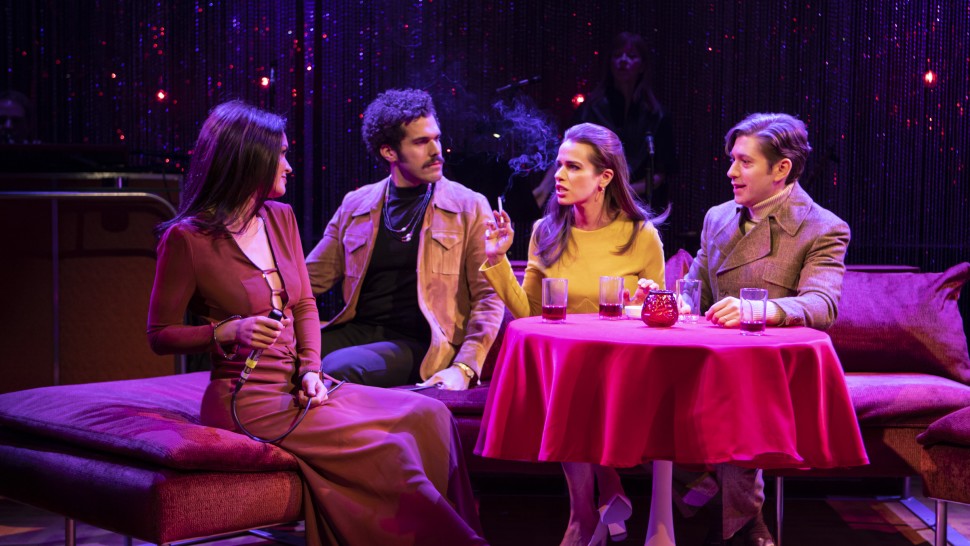“The most serious charge which can be brought against New England is not Puritanism but February.”
Joseph Wood Krutch, The Twelve Seasons
Terry Teachout on the arts in New York City
“The most serious charge which can be brought against New England is not Puritanism but February.”
Joseph Wood Krutch, The Twelve Seasons
* * *
Once upon a fast-receding time, everybody was talking about what was then called the Sexual Revolution, even those for whom it was as yet little more than a rumor. John Updike got himself onto the cover of Time in 1968 by writing “Couples,” a novel about what used to be called “wife-swapping” in a small Massachusetts town. (The gloweringly sober banner on the cover was “THE ADULTEROUS SOCIETY.”) A year later, Paul Mazursky hit big at the box office with “Bob & Carol & Ted & Alice,” a screen comedy about two suburban couples who end up in bed together in a Las Vegas hotel….

These days, it’s almost touching to contemplate the far-off time when, in the darkly ironic words of Philip Larkin, sex was in the process of becoming “a brilliant breaking of the bank,/A quite unlosable game.” To that end, the New Group is now presenting an off-Broadway musical version of “Bob & Carol & Ted & Alice.” Skillfully compressed into a small-scale show with a six-person cast, it tracks Mazursky’s film closely, and if you remember the movie, it might make you smile.
But what if you don’t? What if, like most people under the age of 65, you’ve never heard of “Bob & Carol”? Unlike, say, “Groundhog Day” or “Tootsie,” it isn’t one of those beloved films of yesteryear that are the stuff commodity musicals are made of. Is the stage version artistically strong enough in its own right to overcome the disadvantage of not having a pre-sold audience going in?
Part of the problem with “Bob & Carol,” it turns out, is the source material. In Mazursky’s film, Bob and Carol (played in the film by Culp and Wood and in the musical by Joél Pérez and Jennifer Damiano) spend a weekend at a human-potential retreat in Big Sur (remember those?) and return home determined to become more authentic in every way. The point was that nice people who embrace freer love without fully understanding what they’re getting into are pulling the pin on a grenade that could blow up their lives. But the film, which was widely admired in 1969 for the sharpness of its satire, now comes across as lacking in satirical bite…
Not only does Jonathan Marc Sherman’s book fail to transcend the film’s limitations, but the songs, co-written by Duncan Sheik and Amanda Green, are all soft-rock ballads that are presumably meant to suggest the lost world of the film but end up sounding more bland than anything else….
* * *
Read the whole thing here.The trailer for Bob & Carol & Ted & Alice:
“Style à la ‘Mod,’” a promotional featurette for the original 1969 film:
Peggy Lee sings “Them There Eyes” and “But Beautiful” on The Andy Williams Show, after which she, Williams, and George Gobel do a trio version of “You Are My Sunshine.” This episode was originally telecas tby NBC on September 27, 1962:
(This is the latest in a series of arts- and history-related videos that appear in this space each Monday, Wednesday, and Friday)
“I used to be surprised and shocked because old people accepted the calamities and deaths of their old friends with seeming equanimity. Now I realise that, had they not done so, they would have gone mad.”
James Lees-Milne, diary, November 25, 1975
“He was late for every engagement, which denotes utter selfishness.”
James Lees-Milne, diary, October 31, 1975
Bette Davis appears as the mystery guest on What’s My Line? The panelists are Bennett Cerf, Arlene Francis, Dorothy Kilgallen, and Tony Randall and the host is John Daly. Davis’ segment begins at 20:00. This episode was originally telecast by CBS on March 29, 1964:
(This is the latest in a series of arts- and history-related videos that appear in this space each Monday, Wednesday, and Friday)
“It is audacity to write about anyone from the past. One can never know what their jokes were, their sophisticated nuances. One will take seriously what they laughed at and laugh at what they felt seriously about.”
James Lees-Milne, diary, December 17, 1972
From 2007:
Read the whole thing here.I just got word that another book tentatively called Hotter Than That will be published around the time that my Louis Armstrong biography of the same name will be coming out from Harcourt. No, it’s not an Armstrong biography, but it is about jazz trumpet, which suggests that I may need to come up with another title. The prospect doesn’t unnerve me—my Mencken biography was retitled The Skeptic after I turned the manuscript in to HarperCollins—but it’s not too soon for me to be thinking about a new name, so I thought I’d share my problem with the readers of this blog….
An ArtsJournal Blog